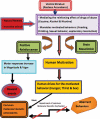Sex, drugs, and rock 'n' roll: hypothesizing common mesolimbic activation as a function of reward gene polymorphisms
- PMID: 22641964
- PMCID: PMC4040958
- DOI: 10.1080/02791072.2012.662112
Sex, drugs, and rock 'n' roll: hypothesizing common mesolimbic activation as a function of reward gene polymorphisms
Abstract
The nucleus accumbens, a site within the ventral striatum, plays a prominent role in mediating the reinforcing effects of drugs of abuse, food, sex, and other addictions. Indeed, it is generally believed that this structure mandates motivated behaviors such as eating, drinking, and sexual activity, which are elicited by natural rewards and other strong incentive stimuli. This article focuses on sex addiction, but we hypothesize that there is a common underlying mechanism of action for the powerful effects that all addictions have on human motivation. That is, biological drives may have common molecular genetic antecedents, which if impaired, lead to aberrant behaviors. Based on abundant scientific support, we further hypothesize that dopaminergic genes, and possibly other candidate neurotransmitter-related gene polymorphisms, affect both hedonic and anhedonic behavioral outcomes. Genotyping studies already have linked gene polymorphic associations with alcohol and drug addictions and obesity, and we anticipate that future genotyping studies of sex addicts will provide evidence for polymorphic associations with specific clustering of sexual typologies based on clinical instrument assessments. We recommend that scientists and clinicians embark on research coupling the use of neuroimaging tools with dopaminergic agonistic agents to target specific gene polymorphisms systematically for normalizing hyper- or hypo-sexual behaviors.
Figures

References
-
- Addad M, Lesiau A. Extraversion, neuroticism, immoral judgment and criminal behaviour. Medicine and Law. 1989;8(6):611–22. - PubMed
-
- American Psychiatric Association (APA) Diagnostic and Statistical Manual of Mental Disorders-IV. American Psychiatric Association; Washington, DC: 1994.
-
- Aron A, Fisher H, Mashek DJ, Strong G, Li H, Brown LL. Reward, motivation, and emotion systems associated with early-stage intense romantic love. Journal of Neurophysiology. 2005;94(1):327–37. - PubMed
-
- Auriacombe M, Tignol J, Le Moal M, Stinus L. Transcutaneous electrical stimulation with Limoge current potentiates morphine analgesia and attenuates opiate abstinence syndrome. Biological Psychiatry. 1990;28(8):650–56. - PubMed
Publication types
MeSH terms
Grants and funding
LinkOut - more resources
Full Text Sources
Medical
